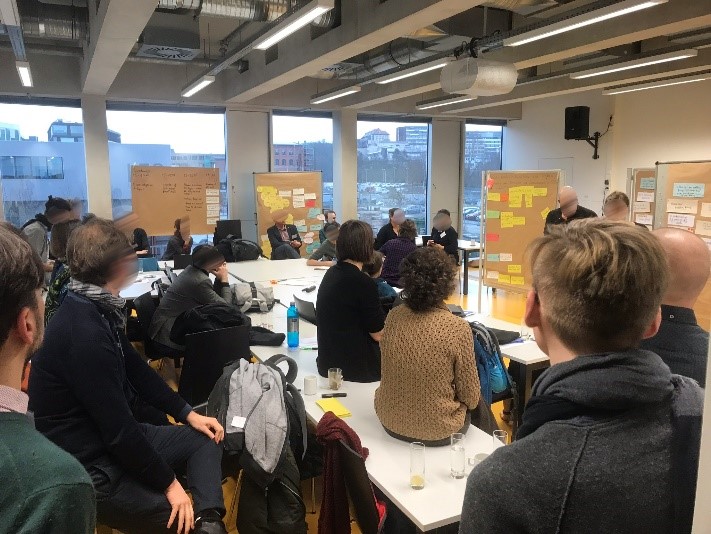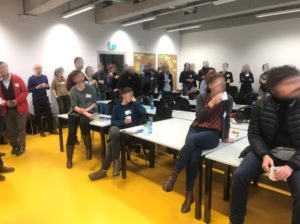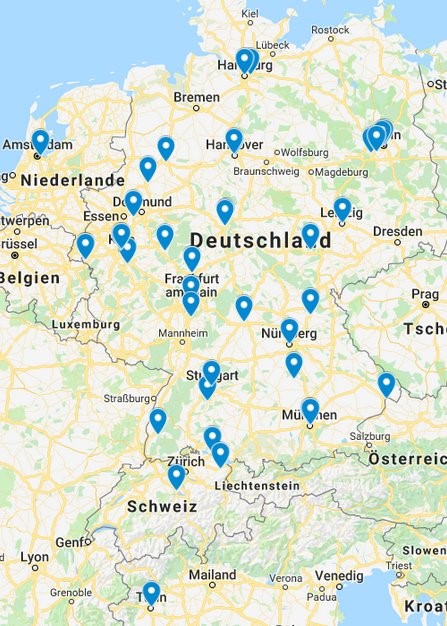
Report of the workshop “STS in Germany – aber wie? Ein offener Workshop zu Aufbau und Organisationsformen von STS-in-Germany“ (Stsing – but how? An open workshop on possible organisation forms of STS-in-Germany) 20-21. 02. 2019 at Kassel University[1]
By Tanja Bogusz, Stefanie Büchner, Endre Dányi, Anja Klein, Stefan Laser, Martina Schlünder and Estrid Sørensen.
In February 2019, around 75 people gathered in Kassel to discuss and define core areas and forms of organising STS in Germany. As organisers, we were amazed to see the number of (mostly young) scholars, keen not only to engage with STS in Germany as a mode of doing research, but also to make STS-in-Germany an inclusive bottom-up research network. Their collaborative spirit will continue to be an important source of inspiration for further engagement and their diverse backgrounds need to be taken into account for the organisational structure that stsing (= doing STS in Germany) will develop.

The Kassel workshop was envisioned as the continuation of a large lunch meeting held at the EASST 2018 conference in Lancaster (see a summary of the event by Jörg Niewöhner here and a personal reflection by Tim Schütz here), but with a focus on the “how to“ question of organizing (see call here). The first impression from the Lancaster meeting was confirmed in Kassel: STS in Germany is alive, geographically and institutionally widespread (roughly 40 institutions were represented!) and already operates as a multidisciplinary and promising field.
Yet this vibrant landscape is also fragmented and formed by strong disciplinary attachments and related funding schemes – something to bear in mind when discussing what it means to do STS in Germany specifically. Another factor is that with many new STS Master’s programmes and training groups, and with various research training groups elsewhere, the first generation of scholars is in the making that gets its education in STS. How this will relate to the existing disciplinary landscape in Germany is still unclear, since MAs and PhDs do not yet translate into professorships and other permanent positions. For the development of stsing however, this generation is a key driver.

For one and a half days, we debated inclusive and experimental ways of developing an organisational form for STS in Germany that answers to different needs voiced by the community at the Lancaster meeting, through social media set up prior to the workshop and by the attendees in Kassel. Based on these, seven discussion groups were formed to debate institutional support, adisciplinarity, peer-support, STS training, international exchange, connecting and communicating, and infrastructure. As inspiration for group discussions, five brief inputs were given about experiences and conditions for inclusive academic organizing by Göde Both, Stefanie Büchner, Max Liboiron, Michelle Murphy and Jutta Weber. In the groups, we experienced an overwhelming output of creative ideas, planned activities and shared areas of thoughts and interests.
The central outcome of the Kassel workshop is the establishment of five working groups: Events, Code of Conduct, Mapping of STS Landscape in Germany, Formal Ways of Peer Support, Web-Platform and Communication Devices. Two to three people from each group took responsibility as “access points” through which people can get in touch with the group (listed here). This is a formalized yet flexible and democratic result. The structure is provisional until the founding conference which is envisaged to happen in the first half of 2020.
The task of deciding on an organizational form turned out to be too complex to finalize at the workshop. Therefore, this question was delegated to the group that had been formed to organize the meeting in Lancaster, but that was extended after Lancaster and after the Kassel meeting will also include representatives from all the working groups. Based on the conclusions from both Lancaster and Kassel, this ‘infrastructure group’ will facilitate an inclusive and participatory process towards deciding upon an organizational form for STS in Germany at the founding conference, which hopefully will take place in 2020.

Considering the fragmented character and experimental dynamics of actual STS activities in Germany, this and other outputs are a great step forward and a success for stsing. Again, thanks to all the attendees for participating and making this happen! We want to invite explicitly those who were not able to attend the workshop but are eager to engage with STS in Germany to get in touch and get involved. Please visit:
www.stsingermany2019.com
[1] The workshop was organized by Tanja Bogusz, Stefanie Büchner, Endre Dányi, Anja Klein, Stefan Laser, Martina Schlünder, Estrid Sørensen. Tahani Nadim did the interpretation between German and English. Logistics: Aylin Dalkiran, Catharina Lüder, Anja-Jäger Mayer, Jonas Müller, Jakob Roschka. We thank Kassel University for supporting the event.